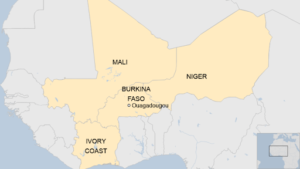In news- Recently, the Burkina Faso military overthrew democratically elected President Roch Marc Christian Kabore and seized control of the country.
Key updates –
- Soldiers on state media declared that the country is being run by their new organization, the Patriotic Movement for Safeguarding and Restoration.
- Kunta, which refers to a committee or administrative council, particularly one that rules a country after a coup d’etat and before a legal government has been established.
About Burkina Faso-
- Burkina Faso, which means “land of honest men“, is a landlocked country in West Africa.
- A former French colony, it gained independence as Upper Volta in 1960.
- Previously called the Republic of Upper Volta (1958–1984), it was renamed “Burkina Faso” in August 1984.
- It is bordered by Mali to the northwest, Niger to the northeast, Benin to the southeast, Togo and Ghana to the south, and the Ivory Coast to the southwest.

- Its capital and largest city is Ouagadougou.
- The largest ethnic group in present-day Burkina Faso is that of the Mossi people.
- The larger part of the country is covered by a peneplain, which forms a gently undulating landscape with, in some areas, a few isolated hills, the last vestiges of a Precambrian massif.
- The southwest of the country, on the other hand, forms a sandstone massif, where the highest peak, Ténakourou, is found.
- The country owes its former name of Upper Volta to three rivers which cross it: the Black Volta (or Mouhoun), the White Volta (Nakambé) and the Red Volta (Nazinon).
- The Black Volta is one of the country’s only two rivers which flow year-round, the other being the Komoe, which flows to the southwest.
- The basin of the Niger River also drains 27% of the country’s surface.
- This country lies within two terrestrial ecoregions: Sahelian Acacia savanna and West Sudanian savanna.
Source: Times of India
















